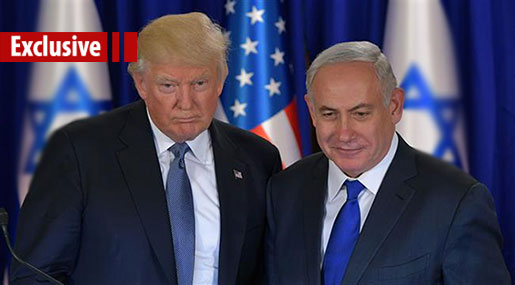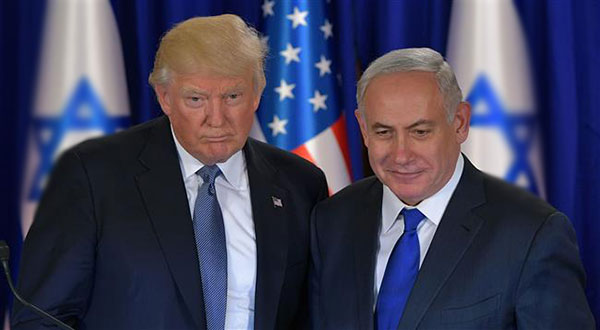The Roaring Mountain that Gave Birth to a Mouse

Darko Lazar
Donald Trump's recognition of "Jerusalem" Al-Quds as the "Israeli" capital spawned mass protests and sporadic violence in different corners of the globe.

The near-universal condemnation of the move was accompanied by extensive analysis in the mainstream media - at times exaggerating the significance of the declaration.
This was in part what Washington was hoping for, as the Al-Quds decision is little more than a desperate attempt to delay the seemingly unstoppable process of the suppression of American influence in the Middle East.
It is precisely this decline of American hegemony in the region that has given way to new, US-fuelled crises - a decades-old Washington doctrine, which maintains that US influence can only be preserved through chaos and confrontation.
But Trump's provocative declaration - merely a follow-up to existing US legislation dating back to 1995 - is unlikely to have the desired effect. The White House maneuver has not only helped to isolate the US. It is also altering the geopolitical landscape to Washington's disadvantage.
The Saudi-"Israeli" alliance
Trump's declaration is also linked to his administration's obsession with subverting Iran.
For Saudi Arabia and its few remaining satellite states, Iran has officially become enemy number one.
There is only one regional entity that shares that level of hostility towards Tehran, and that's "Israel."
This unholy alliance, which is hoping to redefine the concept of ‘resistance' in the Arab psyche, is spurred on by the White House, with Trump's son-in-law Jared Kushner playing the role of mediator.
Responding to the Al-Quds announcement earlier this month, the leader of Lebanon's Hezbollah rightfully pointed out that "Trump had support from the Arabs, or else he wouldn't have been able to do this."
"The Arab governments will scream for a few days then go on with the occupation," Sayyed Hassan Nasrallah said.
Barley a week passed before the Arab monarchies in the Persian Gulf offered the most public demonstration of their emerging alliance with "Israel," which came in the form of a Bahraini delegation strolling through the streets of Al-Quds, hosted by city's occupiers.
But just like Trump's declaration, the Bahraini visit - aimed at getting the Arab street accustomed to the idea of open "Israeli"-Arab ties - appears to have backfired.
The news sparked widespread outrage in Bahrain and across the region, further eroding the legitimacy of the Arab monarchies.
The Iranian-Turkish strategic alliance
The accelerated unveiling of the US-Saudi-"Israeli" axis has further alienated the Arab masses while adding to the already mounting anti-"Israeli" and anti-US sentiment in the region.
The growing level of discontent has opened the door for other Middle Eastern powers to expand their clout, substituting American fuelled-chaos with regional stability and security.
Iran and Turkey have already enjoyed a great deal of success in this respect in both Syria and Iraq's Kurdistan, where the US and its allies have been outwitted.
The Al-Quds crisis offers yet another arena for potential cooperation and the enhancement of the strategic alliance.
The two states are now leading the Muslim world's opposition to the US president's declaration. Moreover, Iran's Hassan Rouhani and Turkey's Recep Tayyip Erdogan have voiced the sharpest condemnation of Riyadh's tacit approval of Trump's move.
At this week's extraordinary summit of the Organization of the Islamic Cooperation (OIC) President Rouhani threw the spotlight on regional countries that are cooperating "with the United States and the Zionist regime and determining the fate of Palestine."
In the lead-up to the conference, Turkey's Foreign Minister Mevlut Cavusoglu accused some Arab states of offering "very weak responses" on Al-Quds.
Not surprisingly perhaps, Arab monarchs stayed clear of the summit in Istanbul, dispatching lower-level officials.
Of course that did nothing to impede the expanding Ankara-Tehran alliance. The two have found common ground on Palestine - the latest on a long list of challenges being posed by Iran and Turkey to the US-Saudi-"Israeli" axis.
Russia's role
Shortly after Trump recognized Al-Quds as the "Israeli" capital, Russia's Vladimir Putin journeyed to the Middle East, visiting no less than three countries.
The first stop was Syria, where he downgraded the Russian military presence following a successful campaign against US-backed militant groups.
Next on the list was Egypt, where he inked a number of important agreements, including one that allows Russia's armed forces to use Egyptian military bases.
The Russians and the Egyptians also found common ground on Libya, where Moscow is once again playing a prominent role.
Putin then traveled to Turkey, where he voiced his backing for Erdogan's rejection of the Al-Quds declaration.
These are the relationships and diplomatic overtures that are shaping the new Middle East. Everything else comprises mere manipulation and attempts to sow unrest by leaders whose armies are in retreat on all fronts.
Washington's only response to its waning influence has come in the form of symbolic gestures and confused statements about what others in the region are doing.
Source: Al-Ahed
Comments




